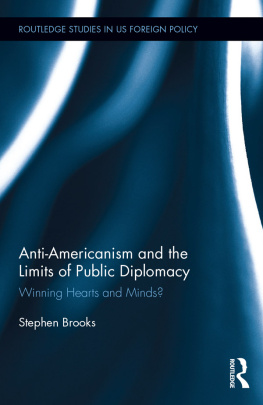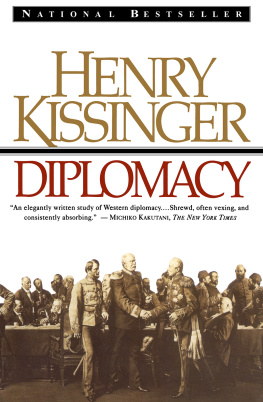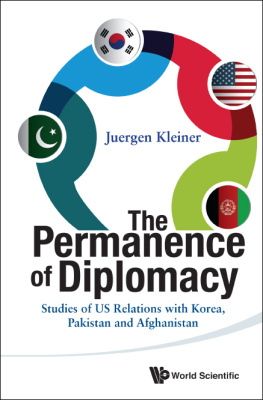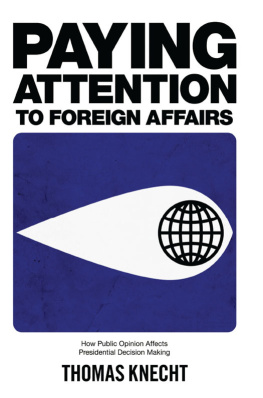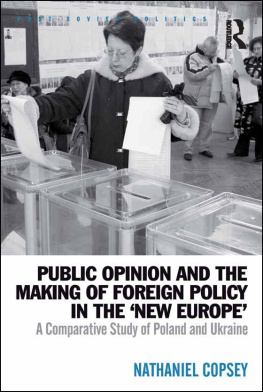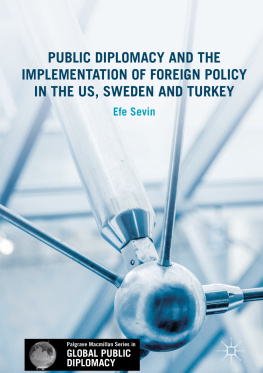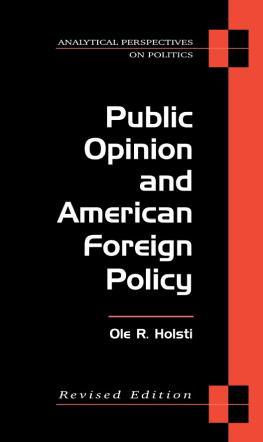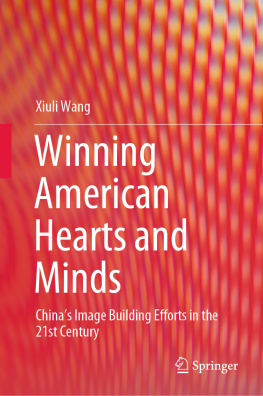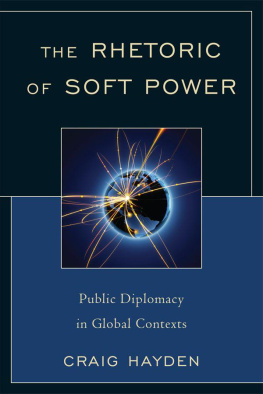A lucid, judicious and well documented study. Not only does it explain the limits of public diplomacy, it greatly enlightens the reader about the origins, evolution and tenacious manifestations of anti-Americanism in different parts of the world.
Paul Hollander, author of Anti-Americanism: Irrational and Rational and editor of Understanding Anti-Americanism: Its Origins and Impact at Home and Abroad
Stephen Brooks has written a thoughtful, insightful and engaging analysis on the limits of American public diplomacy. Policy-makers in the White House and on Capitol Hill should pay close attention to his cautionary tale of how their efforts to employ this instrument of statecraft are often undermined by foreign influences beyond their control. This is an important book written by a distinguished scholar whose voice on these and related issues deserves to be heard. It is a study that will resonate with students of American foreign policy and international relations for years.
Donald E. Abelson, The University of Western Ontario
Ever since the presidency of Woodrow Wilson, American leaders have tried to speak directly to foreign publics, past their governments. Theyve enjoyed quite uneven success in those endeavoursStephen Brooks tackles the reasons why. Anyone interested in understanding why public diplomacy is so challenging needs to read this book.
Mark R. Brawley, McGill University
Anti-Americanism and the Limits of Public Diplomacy
Contrary to the view held by many who study American foreign policy, public diplomacy has seldom played a decisive role in the achievement of the countrys foreign policy objectives. The reasons for this are not that the policies and interventions are ill-conceived or badly executed, although this is sometimes the case. Rather, the factors that limit the effectiveness of public diplomacy lie almost entirely outside the control of American policy-makers. In particular, the resistance of foreign opinion-leaders to ideas and information about American motives and actions that do not square with their preconceived notions of the United States and its activities in the world is an enormous and perhaps insurmountable wall that limits the impact of public diplomacy.
This book does not conclude that public diplomacy has no place in the repertoire of American foreign policy. Instead, the expectations held for this soft power tool need to be more realistic. Public diplomacy should not be viewed as a substitute for hard power tools that are more likely to be correlated with actual American influence as opposed to the somewhat nebulous concept of American standing.
Stephen Brooks is Director of the Ottawa Internship Program at the University of Michigan and Professor at the University of Windsor, Canada. His books focus on aspects of Canadian and American politics, including several that deal with foreign perceptions of the United States.
Routledge Studies in US Foreign Policy
Edited by Inderjeet Parmar, City University, and John Dumbrell, University of Durham
This new series sets out to publish high quality works by leading and emerging scholars critically engaging with United States foreign policy. The series welcomes a variety of approaches to the subject and draws on scholarship from international relations, security studies, international political economy, foreign policy analysis, and contemporary international history.
Subjects covered include the role of administrations and institutions, the media, think tanks, ideologues and intellectuals, elites, transnational corporations, public opinion, and pressure groups in shaping foreign policy, US relations with individual nations, with global regions and global institutions and Americas evolving strategic and military policies.
The series aims to provide a range of booksfrom individual research monographs and edited collections to textbooks and supplemental reading for scholars, researchers, policy analysts, and students.
United States Foreign Policy and National Identity in the 21st Century
Edited by Kenneth Christie
New Directions in US Foreign Policy
Edited by Inderjeet Parmar, Linda B. Miller and Mark Ledwidge
Americas Special Relationships
Foreign and domestic aspects of the politics of alliance
Edited by John Dumbrell and Axel R. Schfer
US Foreign Policy in Context
National ideology from the founders to the Bush doctrine
Adam Quinn
The United States and NATO since 9/11
The transatlantic alliance renewed
Ellen Hallams
Soft Power and US Foreign Policy
Theoretical, historical and contemporary perspectives
Edited by Inderjeet Parmar and Michael Cox
The US Public and American Foreign Policy
Edited by Andrew Johnstone and Helen Laville
American Foreign Policy and Postwar Reconstruction
Comparing Japan and Iraq
Jeff Bridoux
Neoconservatism and American Foreign Policy
A critical analysis
Danny Cooper
US Policy Towards Cuba
Since the Cold War
Jessica F. Gibbs
Constructing US Foreign Policy
The curious case of Cuba
David Bernell
Race and US Foreign Policy
The African-American foreign affairs network
Mark Ledwidge
Gender Ideologies and Military Labor Markets in the U.S.
Saskia Stachowitsch
Prevention, Pre-Emption and the Nuclear Option
From Bush to Obama
Aiden Warren
Corporate Power and Globalization in US Foreign Policy
Edited by Ronald W. Cox
West Africa and the US War on Terror
Edited by George Klay Kieh and Kelechi Kalu
Constructing Americas Freedom Agenda for the Middle East
Oz Hassan
The Origins of the US War on Terror
Lebanon, Libya and American intervention in the Middle East
Mattia Toaldo
US Foreign Policy and the Rogue State Doctrine
Alex Miles
US Foreign Policy and Democracy Promotion
From Theodore Roosevelt to Barack Obama
Edited by Michael Cox, Timothy J. Lynch and Nicolas Bouchet
Local Interests and American Foreign Policy
Why international interventions fail
Karl Sandstrom
The Obama Administrations Nuclear Weapon Strategy
The promises of Prague
Aiden James Warren
Obamas Foreign Policy
Ending the War on Terror
Michelle Bentley and Jack Holland
United StatesAfrica Security RelationsTerrorism, Regional Security and National interests
Edited by Kelechi A. Kalu and George Klay Kieh, Jr.
Obama and the World
New directions in US foreign policy. Second edition
Edited by Inderjeet Parmar, Linda B. Miller and Mark Ledwidge
The United States, Iraq and the Kurds
Mohammed Shareef
Weapons of Mass Destruction and US Foreign Policy
The strategic use of a concept
Michelle Bentley
American Images of China
Identity, power, policy
Oliver Turner
North KoreaUS Relations under Kim Jong II
The quest for normalization
Ramon Pacheco Pardo
Congressional Policymaking in the Post-Cold War Era
Sino-U.S. relations
Joseph Gagliano
US Foreign Policy and China
Bushs first term
Guy Roberts
Presidential Rhetoric from Wilson to Obama
Constructing crises, fast and slow
Wesley Widmaier

